
The contagious poetry of Alejandra Pizarnik
On the 50th anniversary of the Argentinean writer's death, new books about her work and her enigmatic life are being published.
Why is it that everyone who talks about Pizarnik does so almost under Pizarnik's sign, as if in remembering her they were trying to emulate her?
"She had difficulty with the group, in the sense of integrating herself into life, into layers of life, into movements. She was already separated, cut out of her niche," the writer Tamara Kamenszain once said.
The poet's friend Ivonne Bordelois also said in an interview: "She felt totally abandoned by the world: what would the world say if God had abandoned it like that, as he abandoned me, she said. She had a feeling of total helplessness."
Perhaps the key to how a great poet inspires poetry to be made about her lies with one of her biographers, Cristina Piña, who pointed out in an interview with El País that Pizarnik's verses are dangerous, they impregnate the writing of those who read them. And even, according to the statements made about her figure, the speech as well.
Beyond the romanticization of her depression and suicide, or her comparisons with Rimbaud, who, unlike her, never aspired to be a writer but was a trafficker in arms and slaves who made "live fast, leave a beautiful corpse and a handful of colossal poems" her own, Alejandra Pizarnik is more than the myth of a cursed poet. Her verses speak for themselves, but so do her theater, her letters, her dabbling in journalism...
For the 50th anniversary of her death, publishers, writers and biographers have unusually conspired to publish books that pay tribute to the author and delve into very unusual parts of her biography.
On the one hand, the publishing house Huso has brought together 85 writers from 15 countries - Spain, Argentina, Chile, Cuba, Uruguay, Peru, Mexico, Poland, Bulgaria, Australia, Morocco, France, Romania, Italy and Israel - in a book that celebrates the writer and is edited by Mayda Bustamante, who humorously writes in the prologue that Pizarnik "suicide played a dirty trick on her. She never counted on her death making her immortal."
RELATED CONTENT
In 2022 the Spanish publishing house Lumen will also publish Alejandra Pizarnik. Biografía de un mito, by Cristina Piña and Patricia Venti - to be published this July in Argentina - a biography that brings to light little-known facets of the dazzling poet:
"Today we know that she was much more: a fascinating diarist, a shrewd literary critic and, also, the author of profoundly transgressive narrative texts that began to be known from 1982 onwards," said Piña.
Alejandra Pizarnik's fame began to grow in 2000 when much of her poetry, prose and diaries were published, under the care of her executor, the writer Ana Becciu. But there are still many unpublished works at Princeton University that promise to reveal many surprises about the Argentine poet of whom the writer César Aira, somewhat unfortunately, said she was "the last luxury object of Argentine literature."
In 2018 her sister Myriam Pizarnik donated 122 volumes and folders of Alejandra's (née Flora) work to the National Library of Argentina, adding to the 650 already acquired by the institution. All of them will surely feature in the tributes to her on her death.
In the meantime, Alejandra Pizarnik's legacy can be followed in works such as Diana's Tree, The Most Foreign Land, A Musical Inferno and the story "The Bloody Countess."
But beware of being impregnated by her wounded language. Or much better, let it splash all over you.












LEAVE A COMMENT: